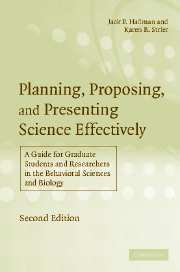 Planning, Proposing, and Presenting Science Effectively
Planning, Proposing, and Presenting Science Effectively 1 - How to plan research
Published online by Cambridge University Press: 01 September 2010
Summary
The great tragedy of Science – the slaying of a beautiful hypothesis by an ugly fact.
Thomas Henry Huxley (1825–95)Success in science, as in most complex endeavors, depends partly on preparedness and planning. The three Persian princes of Serendip notwithstanding, a great truth is found in the aphorism that chance favors the prepared mind. No mere chapter could constitute a complete guide to planning research. This one attempts to cover the main points common to most projects. We begin with a background sketch of epistemology: how science as a whole works and the roles of individual investigators. That introduction provides a framework for discussing specific issues of planning research. Subsequent chapters deal with some of the major steps of doing science (e.g. how to write a grant proposal and how to communicate the results of research) that ensue after good planning.
SCIENTIFIC EPISTEMOLOGY
In order to plan research effectively, the investigator should understand how his or her activities fit into the endeavor of science as a whole. Some explanations of the “scientific method” confound epistemology – how we accumulate knowledge and understanding through science – with specific research activities of the individual investigator. This section attempts to disentangle the two by sketching the “big picture” first and then showing where the practicing scientist fits in.
Science as process and product
One can conceive of science as a cycle of activities and results based on procedures that are often referred to as the “hypothetico-deductive method.”
- Type
- Chapter
- Information
- Planning, Proposing, and Presenting Science EffectivelyA Guide for Graduate Students and Researchers in the Behavioral Sciences and Biology, pp. 1 - 33Publisher: Cambridge University PressPrint publication year: 2006


